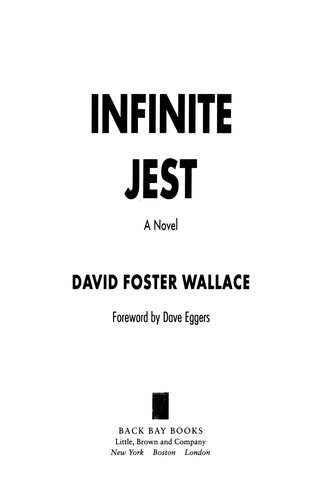1) "Recreational drugs are more or less traditional at any U.S. secondary school, maybe because of the unprecedented tensions: post-latency and puberty and angst and impending adulthood, etc. To help manage the intra-psychic storms, etc. Since the place's inception, there's always been a certain percentage of the high-caliber adolescent players at E.T.A. who manage their internal weathers chemically. Much of this is good clean temporary fun; but a traditionally smaller and harder-core set tends to rely on personal chemistry to manage E.T.A.'s special demands—dexedrine or low-volt methedrine before matches and benzodiazapenes to come back down after matches, with Mudslides or Blue Flames at some understanding Comm. Ave. nightspot or beers and bongs in some discreet Academy corner at night to short-circuit the up-and-down cycle, mushrooms or X or something from the Mild Designer class—or maybe occasionally a little Black Star, whenever there's a match- and demand-free weekend, to basically short out the whole motherboard and blow out all the circuits and slowly recover and be almost neurologically reborn and start the gradual cycle all over again..."
2) "Tennis's beauty's infinite roots are self-competitive. You compete with your own limits to transcend the self in imagination and execution. Disappear inside the game: break through limits: transcend: improve: win. Which is why tennis is an essentially tragic enterprise, to improve and grow as a serious junior, with ambitions. You seek to vanquish and transcend the limited self whose limits make the game possible in the first place. It is tragic and sad and chaotic and lovely. All life is the same, as citizens of the human State: the animating limits are within, to be killed and mourned, over and over again."
3) "'Uh oh. Dinnertime. Triangle's a-clangin' over in West.'
'Hey Hallie though? Hang on. Kidding aside for a second. What all do you know about Separatism?'
Hal stopped for a moment. 'You mean in Canada?'
'Is there any other kind?'"
4) "The cable kabal's promise of 'empowerment,' the campaign argued, was still just the invitation to choose which of 504 visual spoon-feedings you'd sit there and open wide for. And so but what if, their campaign's appeal basically ran, what if, instead of sitting still for choosing the least of 504 infantile evils, the vox- and digitus-populi could choose to make its home entertainment literally and essentially adult? I.e. what if—according to InterLace—what if a viewer could more or less 100% choose what's on at any given time? Choose and rent, over PC and modem and fiber-optic line, from tens of thousands of second-run films, documentaries, the occasional sport, old beloved non–'Happy Days' programs, wholly new programs, cultural stuff, and c., all prepared by the time-tested, newly lean Big Four's mammoth vaults and production facilities and packaged and disseminated by InterLace TelEnt. in convenient fiber-optic pulses that fit directly on the new palm-sized 4.8-mb PC-diskettes InterLace was marketing as 'cartridges'? Viewable right there on your trusty PC's high-resolution monitor? Or, if you preferred and so chose, jackable into a good old premillennial wide-screen TV with at most a coaxial or two? Self-selected programming, chargeable on any major card or on a special low-finance-charge InterLace account available to any of the 76% of U.S. households possessed of PC, phone line, and verifiable credit? What if, Veals's spokeswoman ruminated aloud, what if the viewer could become her/his own programming director; what if s/he could define the very entertainment-happiness it was her/his right to pursue?"
5) "Bob Death smiles coolly (South Shore bikers are required to be extremely cool in everything they do) and manipulates a wooden match with his lip and says No, not that fish-one. He has to assume a kind of bar-shout to clear the noise of his idling hawg. He leans in more toward Gately and shouts that the one he was talking about was: This wise old whiskery fish swims up to three young fish and goes, 'Morning, boys, how's the water?' and swims away; and the three young fish watch him swim away and look at each other and go, 'What the fuck is water?' and swim away. The young biker leans back and smiles at Gately and gives an affable shrug and blatts away, a halter top's tits mashed against his back."
6) "The anhedonic can still speak about happiness and meaning et al., but she has become incapable of feeling anything in them, of understanding anything about them, of hoping anything about them, or of believing them to exist as anything more than concepts. Everything becomes an outline of the thing. Objects become schemata. The world becomes a map of the world. An anhedonic can navigate, but has no location. I.e. the anhedonic becomes, in the lingo of Boston AA, Unable To Identify."
7) "It's of some interest that the lively arts of the millennial U.S.A. treat anhedonia and internal emptiness as hip and cool. It's maybe the vestiges of the Romantic glorification of Weltschmerz, which means world-weariness or hip ennui. Maybe it's the fact that most of the arts here are produced by world-weary and sophisticated older people and then consumed by younger people who not only consume art but study it for clues on how to be cool, hip—and keep in mind that, for kids and younger people, to be hip and cool is the same as to be admired and accepted and included and so Unalone. Forget so-called peer-pressure. It's more like peer-hunger. No? We enter a spiritual puberty where we snap to the fact that the great transcendent horror is loneliness, excluded encagement in the self. Once we've hit this age, we will now give or take anything, wear any mask, to fit, be part-of, not be Alone, we young. The U.S. arts are our guide to inclusion. A how-to. We are shown how to fashion masks of ennui and jaded irony at a young age where the face is fictile enough to assume the shape of whatever it wears. And then it's stuck there, the weary cynicism that saves us from gooey sentiment and unsophisticated naïveté. Sentiment equals naïveté on this continent (at least since the Reconfiguration). One of the things sophisticated viewers have always liked about J. O. Incandenza's The American Century as Seen Through a Brick is its unsubtle thesis that naïveté is the last true terrible sin in the theology of millennial America."
8) "This is why Moms are so obsessively loving, why they try so hard no matter what private troubles or issues or addictions they have of their own, why they seem to value your welfare above their own, and why there's always a slight, like, twinge of selfishness about their obsessive mother-love: they're trying to make amends for a murder neither of you quite remember, except maybe in dreams."
9) "No one single instant of it was unendurable. Here was a second right here: he endured it. What was undealable-with was the thought of all the instants all lined up and stretching ahead, glittering. And the projected future fear of the A.D.A., whoever was out there in a hat eating Third World fast food; the fear of getting convicted of Nuckslaughter, of V.I.P.-suffocation; of a lifetime on the edge of his bunk in M.C.I. Walpole, remembering. It's too much to think about. To Abide there. But none of it's as of now real. What's real is the tube and Noxzema and pain. And this could be done just like the Old Cold Bird. He could just hunker down in the space between each heartbeat and make each heartbeat a wall and live in there. Not let his head look over. What's unendurable is what his own head could make of it all. What his head could report to him, looking over and ahead and reporting. But he could choose not to listen; he could treat his head like G. Day or R. Lenz: clueless noise. He hadn't quite gotten this before now, how it wasn't just the matter of riding out the cravings for a Substance: everything unendurable was in the head, was the head not Abiding in the Present but hopping the wall and doing a recon and then returning with unendurable news you then somehow believed."
10) "'They'll have to move us around to different sites. It's a pain in the ass, but Schtitt's done it before. I think the real variable'll be whether the Québec kids got into Logan last night before whenever it was this hit.'
'Logan'll be shut down you're saying.'
'But I think we'd have heard if they got in last night. Freer and Struck were keeping tabs on an F.A.A. link ever since supper, Mario said.'
'Boys are looking to get X'd by some slow-witted hairy-legged foreign girls or what?'
'My guess is they're stuck up at Dorval. I'll bet C.T. is on the case even now. Get some sort of announcement at breakfast, probably.'em!"
11) "Something like a shadow flanked the vividness and lucidity of the world."
12) "It now lately sometimes seemed like a kind of black miracle to me that people could actually care deeply about a subject or pursuit, and could go on caring this way for years on end. Could dedicate their entire lives to it. It seemed admirable and at the same time pathetic. We are all dying to give our lives away to something, maybe. God or Satan, politics or grammar, topology or philately—the object seemed incidental to this will to give oneself away, utterly. To games or needles, to some other person. Something pathetic about it. A flight-from in the form of a plunging-into. Flight from exactly what? These rooms blandly filled with excrement and meat? To what purpose? This was why they started us here so young: to give ourselves away before the age when the questions why and to what grow real beaks and claws. It was kind, in a way. Modern German is better equipped for combining gerundives and prepositions than is its mongrel cousin. The original sense of addiction involved being bound over, dedicated, either legally or spiritually. To devote one's life, plunge in. I had researched this. Stice had asked whether I believed in ghosts. It's always seemed a little preposterous that Hamlet, for all his paralyzing doubt about everything, never once doubts the reality of the ghost. Never questions whether his own madness might not in fact be unfeigned. Stice had promised something boggling to look at. That is, whether Hamlet might be only feigning feigning."



